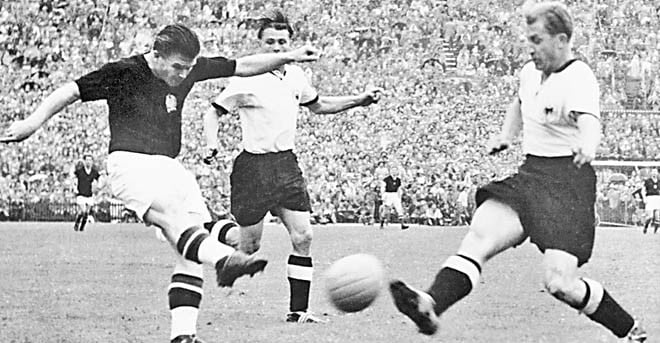

The history of FIFA World Cup throws up so many memorable stories. The 1954 World Cup is remembered for the ‘Miracle of Bern’ referring to the final played between Germany and Hungary in Bern, Switzerland.
The extraordinarily talented Hungarian team -- one of the finest in the history -- also known as the Magical Magyars, had been unbeaten for four years. During this period, they had achieved some wonderful results, including the gold medal at the 1952 Olympics. Then there was that historic 6-3 thrashing of England in November 1953 -- the first time ever a foreign team had triumphed at Wembley.
Hungary entered the 1954 World Cup as everyone’s favourites. The side had many stars. The prolific scorer Sandor Kocsis had topped the European scoring charts for any league in 1952 and 1954. He carried his rich vein of form at the biggest stage as well with 11 goals in 1954, setting a new World Cup record for most goals in any edition.
But the biggest star was their captain Ferenc Puskas, called the ‘Galloping Major’ and widely acknowledged as one of the all-time greats. In 2003, he was declared the best Hungarian player of the last 50 years by the Hungarian Football Federation.
Scorer of 84 goals in 85 international appearances, he was also the player of tournament at the 1954 World Cup.
The Magical Magyars announced their arrival in the opening match in an emphatic fashion. Hungary’s 9-0 result against Korea remains to this day the biggest margin of victory in FIFA World Cup history, later equalled by Yugoslavia’s win over Zaire (9-0) in 1974 and Hungary’s over El Salvador (10-1) in 1982.
This was followed by an 8-3 win over West Germany. However, this result proved less instructive than it may have initially appeared. The tournament’s format was such that the two seeded teams in each group played only the two non-seeds, and vice versa. The canny German coach Sepp Herberger went into the Hungary game knowing his side could lose and still progress in second place by winning a play-off against the group’s other seeds, Turkey, whom they had already beaten 4-1. Herberger thus played seven reserves. West Germany lost heavily to Hungary. A much-strengthened lineup won the play-off against Turkey 7-2 and that took them into the quarter-finals.
Puskas had suffered a hairline fracture of the ankle and missed out the quarter-final and the semi-final. Even without him, the irrepressible Hungarians dismissed the South American big guns, Brazil and Uruguay, in the quarter-final and semi-final, respectively, by identical margins of 4-2.
From the other end, West Germany made it to the final. The resurgent Germans had thrashed Austria 6-1 in the semi-final with brothers Fritz and Ottmar Walter both scoring twice.
Hungary were the odds-on favourites in the final. Puskas had not fully recovered but played and it was their greatest footballer who put the Magyars ahead. His opener in the sixth minute was followed by Zoltan Czibor’s goal within the next two minutes.
Many envisaged a rout similar to the one witnessed in the group match. The final was played in heavy rain, weather conditions the German side had christened "Fritz Walter-weather", as the German team captain Fritz Walter was known for playing his best football under those conditions. Moreover, the Germans were equipped with footwear supplied by Adidas, which had produced a hitherto unheard of design of boot with exchangeable, screw-in studs that could be adapted to any weather.
Germany responded quickly and equalised with goals from Max Morlock (10’) and Helmut Rahn (18’). All of a sudden, the Germans looked a match for the Hungarians and the half time arrived at 2-2.
In the second half, the fearsome Hungarians launched a number of raids but the German defence stood firm with the goalkeeper Toni Turek executing a number of excellent saves.
The allotted time was coming to an end. With just six minutes left, Helmut Rahn scored his second and his team’s third goal to put Germany ahead for the first time. The Hungarians were not finished yet and just two minutes before the final whistle Puskas put the ball into the net but only to be ruled offside. The epic World Cup final ended with the invincible Hungarians suffering their first-ever defeat in four years -- could not have arrived at a worse moment.
In the shadow of the Alps this was a mountain-sized upset, the Germans retrieving a two-goal deficit to record a 3-2 victory over opponents who had beaten them 8-3 just a fortnight before.
Germany had been psychologically and economically shattered by the World War II. Winning the most coveted prize in the world of sports, by beating the world’s strongest team against all the odds, gave the country new pride and confidence.
The Miracle of Bern was translated into a German movie of the same name in 2003 (in German: Das Wunder von Bern). It narrated the story of the German team’s route to victory through the eyes of a young boy who admires the star of the final, Helmut Rahn.
The movie turned out to be one of the best sellers of all the German movies attracting more than six million cine viewers.
The great German achievement at the 1954 World Cup epitomises what sports can do to the morale of a nation.